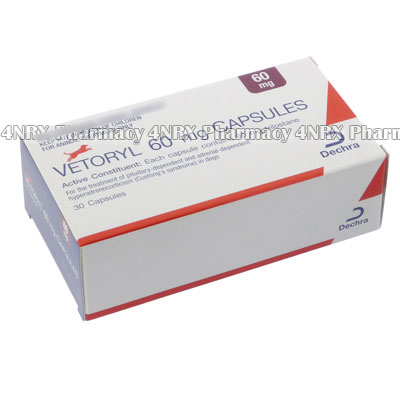 |
Home  4NRX Pet Pharmacy 4NRX Pet Pharmacy  Vetoryl (Trilostane) Vetoryl (Trilostane) |
|
|||||||||
|
|
Vetoryl (Trilostane)
What is Vetoryl (Trilostane) used for? Vetoryl (Trilostane) is an oral medication used to treat dog's suffering from Cushing's syndrome. It operates by blocking excess production of cortisol by the adrenal gland to reduce symptoms associated with this condition such as hypertension, weight gain, or excess fatigue. Your veterinarian may also prescribe this medication to treat other unlisted conditions. How should I use Vetoryl (Trilostane)? Always follow your veterinarian's instructions while using Vetoryl (Trilostane) to get the most effective results from treatment. One capsule is typically administered once daily, but the best dosage will be determined by your dog's weight, health condition, and the severity of its symptoms. The capsules may be hidden in the dog's meal or a snack if you have trouble giving the medication. Do not open or dissolve the contents of the capsules before use to avoid destroying or altering the effects of their contents. Ask your veterinarian if you have any questions about the medicine to make sure you are using it correctly. What are the side effects of Vetoryl (Trilostane)? Side effects that may occur in your pet while using Vetoryl (Trilostane) include:
Serious side effects that may require immediate medical assistance are seizures, faintness, severe diarrhea that is bloody or watery, or signs of an allergic reaction such as hives, swelling, or difficulty breathing. Immediately inform your veterinarian if you observe any unusual or worrying symptoms to make sure the correct alterations are made to the dog's dosage or frequency of administration to prevent further complications from occurring. Please Note Vetoryl (Trilostane) should not be given to dogs that are nursing, pregnant, that have reduced kidney function, or reduced liver function. Strictly follow all instructions provided to you by your veterinarian or pharmacist while using Vetoryl (Trilostane). Optimum and safe dosage can differ based on the animal and the condition being treated. As this medication may be unsafe for certain pets, it is essential you always inform your veterinarian if the animal is pregnant or nursing, as well as if it has any allergies, other illnesses, or ongoing health conditions, and if it is taking any other form of medication, supplements, or herbal products. Immediately seek emergency medical care if your pet has an allergic or hypersensitive reaction. Common signs of a reaction include hives, swelling, skin rashes, chest pains, as well as trouble breathing or swallowing. 
|
||||||||||||||||||||||